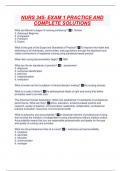NURS 345- EXAM 1 PRACTICE AND
COMPLETE SOLUTIONS
What are Benner's stages of nursing proficiency? ✅1. Novice
2. Advanced Beginner
3. Competent
4. Proficient
5. Expert
What is the goal of the Scope and Standards of Practice? ✅To improve the health and
well-being of all individuals, communities, and populations through the significant and
visible contributions of registered nursing using standards-based practice
When did nursing documentation begin? ✅1960
What are the six standards of practice? ✅1. assessment
2. diagnosis
3. outcomes identification
4. planning
5. implementation
6. evaluation
What is known as the foundation of clinical decision making? ✅the nursing process
What is a code of ethics? ✅the philosophical ideals of right and wrong that define
principles used to provide care
The American Nurses Association (ANA) has established 10 standards of professional
performance. What are they? ✅ethics, education, evidence-based practice and
research, quality of practice, communication, leadership, collaboration, professional
practice evaluation, resources, environmental health
What is autonomy and accountability? ✅an essential element of professional nursing
that involves the initiation of independent nursing interventions without medical orders.
Accountability means that you are responsible professionally and legally for the type
and quality of nursing care provided
What are the professional roles of a nurse? ✅1. autonomy and accountability
2. caregiver
3. advocate
4. educator
5. communicator
6. manager
,1. Nursing is defined as a profession because nurses:
A. perform specific skills.
B. practice autonomy.
C. utilize knowledge from the medical discipline.
D. charge a fee for services rendered. ✅B. practice autonomy
What does MLP stand for? ✅mid-level provider
What is a clinical nurse specialist? ✅an APRN who is an expert clinician in a
specialized area of practice, such as a population (e.g., geriatrics), a setting (e.g.,
critical care), a disease specialty (e.g., diabetes), a type of care (e.g., rehabilitation), or
a type of problem (e.g., pain).
What is an advanced practice nurse? ✅The advanced practice registered nurse
(APRN) is the most independently functioning nurse. An APRN has advanced education
in pathophysiology, pharmacology, and physical assessment, and certification and
expertise in a specialized area of practice. There are four core roles for the APRN:
clinical nurse specialist (CNS), certified nurse practitioner (CNP), certified nurse midwife
(CNM), and certified RN anesthetist (CRNA).
What is a nurse practitioner? ✅an APRN who provides health care to a group of
patients, usually in an outpatient, ambulatory care, or community-based setting. NPs
provide care for patients with complex problems and a more holistic approach than
physicians
What is a certified nurse midwife? ✅an APRN who is also educated in midwifery and is
certified by the American College of Nurse-Midwives. The practice of nurse-midwifery
involves providing independent care for women during normal pregnancy, labor, and
delivery and care for the newborn
What is a certified registered nurse anesthetist? ✅an APRN with advanced education
from a nurse anesthesia-accredited program. Nurse anesthetists provide surgical
anesthesia under the guidance and supervision of an anesthesiologist who is a
physician with advanced knowledge of surgical anesthesia
What is a nurse educator? ✅works primarily in schools of nursing, staff development
departments of health care agencies, and patient education departments
What is a nurse administrator? ✅manages patient care and the delivery of specific
nursing services within a health care agency
What is a nurse researcher? ✅investigates problems to improve nursing care and
further define and expand the scope of nursing practice. The nurse research often
, works in an academic setting, hospital, or independent professional or community
service agency
Who is Florence Nightingale and what did she do? ✅Florence Nightingale believed
that the role of nurses was to help the body recover, and then remain free, from
disease.
In 1860, Florence organized the first school of nursing, the Nightingale Training School
for Nurses, at St. Thomas' Hospital in London.
Nightingale was the first practicing epidemiologist. She used her keen mind and
statistical analysis to show the connection between poor sanitation and diseases like
cholera and dysentery.
Known as the Lady with the Lamp, Nightingale crossed the battlefields of the Crimean
War with her lantern. By improving sanitation in battlefield hospitals, she showed how
effective fresh air, hygiene, and nutrition were in the treatment of wounded soldiers.
The practices she advocated remain a basic part of nursing care in the twenty-first
century.
What happened to nursing in the early twentieth century? ✅Movement toward
scientific, research-based practice and defined body of knowledge;
Nurses assumed expanded and advanced practice roles
Who was Mary Adelaide Nutting? ✅1906: first nursing professor at Columbia
Teacher's College
What year did nursing specializations begin? ✅1920
How will the Affordable Care Act affect healthcare and nursing? ✅The ACA affects
how health care is paid for and delivered. There will be greater emphasis on health
promotion, disease prevention, and illness management in the future. More nursing
services will be in community-based care settings. As a result, more nurses will be
needed to practice in community care centers, schools, and senior centers. This will
require nurses to be better able to assess for resources, identify service gaps, and help
patients adapt so as to be able to safely return to their community.
Skyrocketing health care costs present challenges to the nursing profession, consumer,
and health care delivery system. As a nurse you are responsible for providing patients
with the best-quality care in an efficient and economically sound manner.
What is QSEN? ✅QSEN addresses the challenge to prepare nurses with the
competencies needed to continuously improve the quality of care in their work
environments. The QSEN initiative encompasses the competencies of patient-centered
care, teamwork and collaboration, evidence-based practice, quality improvement,
safety, and informatics
What does QSEN stand for? ✅Quality and Safety Education for Nurses




